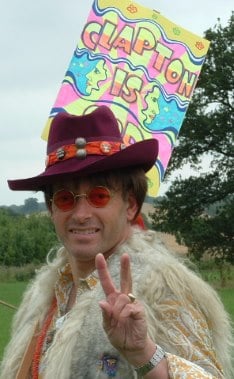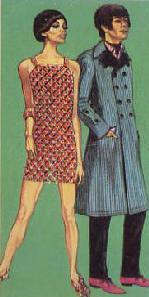The British Cinema of the New Was a Continuation of What 1960s Movement
If the Fifties were in black and white, then the Sixties were in Technicolor. The 'Swinging Sixties' remain the defining decade for Britain. In just ten short years, London had transformed from the bleak, conservative city, only just beginning to forget the troubles of the Second World War, into the capital of the world, full of freedom, hope and promise. It was the centre of all excitement; the city where anything and everything was possible. And yet, does anyone truly know how it was possible for decades of change to take place in just ten years?
By the 1960s, the first teenage generation free from conscription emerged in Britain. Young people were finally given a voice and freedom to do what they wanted. The parents of the Sixties teenage generation had spent their youth fighting for their lives in the Second World War and wanted their own children to enjoy their youth and be able to have more fun and freedom. By the early 1960s, teenagers were already significantly different to those of a decade ago.
One of the biggest, defining aspects of the 1960s was music. Although rock and roll began having an effect on Britain in the 1950s, it wasn't until the early Sixties and the emergence of 'British Invasion' groups like The Beatles, that music truly began its revolutionary changes. The Beatles are an excellent example of how music influenced the lives of young Britons. Although they continued the rock and roll genre of the 1950s for the early part of the decade, by 1967 Sgt Pepper's Lonely Hearts Club Band became the turning point in music and inspired other musicians, such as The Beach Boys and The Rolling Stones, to experiment with new sounds and develop innovative pieces of music. Their later albums included lyrics encouraging rebellion against the authorities, as seen in 'Revolution'. Young people began to stand up for their beliefs and their individuality.

Recreational drugs were also synonymous with the Sixties and became more commonly used in the latter part of the decade. Images of the Woodstock festival show people high on marijuana and LSD, dancing in fields with paint on their face and their hair flowing free. It was very difficult for anyone in show business to avoid becoming involved in drugs in some way and as easily influenced young people looking for fun, many were encouraged to follow their idols and take hallucinogenic drugs. LSD made people feel happy and optimistic and helped bring about the 'hippie' movement. The effects of these drugs were also reflected in psychedelic art and films, bringing new, vibrant and exciting colours and patterns to the forefront. The 'Yellow Submarine' film with its combination of psychedelic pictures and music illustrates this perfectly.

Although Britain wasn't directly involved in the Vietnam War, British musicians such as John Lennon brought it to the attentions of British people through protests against the conflict. Songs like 'Give Peace a Chance' showed people the horrors and pointlessness of war and fans followed in the footsteps of their idols to pursue peace and freedom. This became one of the biggest aspects associated with the 'hippie' movement. People began to challenge and question authority, something that would have been unheard of a decade ago.
The Profumo Affair, a scandalous mix of sex, spies and government, captured the public's attention in 1963. The Secretary for War John Profumo was discovered to be having an affair with a woman who was also seeing a Russian military attaché. Profumo denied the affair but later admitted that he had lied to the House of Commons and resigned. The affair changed the relationship between government and press forever and seriously undermined the public's trust in politicians. The traditional deference to figures of authority was now gradually being replaced by suspicion and mistrust.

Fashion in the decade mirrored many of the social changes of the Sixties. Mary Quant became famous for popularising the mini skirt which became the epitome of 1960s fashion. The mini was designed to be free and liberating for women, allowing them to "run and jump". Her fashion designs used simple geometric shapes and colours which gave women a new kind of femininity. Women were free to wear more playful, youthful clothes that would have seemed outrageous ten years before. By the late Sixties, psychedelic prints and vibrant colours began appearing on clothes as the hippie movement gathered pace.
Feminism began to become a more influential ideology as more jobs became available to young women in the Sixties. This allowed them to move away from home and become more independent. The contraceptive pill became legalised for all women in 1967 and gave them the opportunity to broaden their hopes and dreams far beyond motherhood and marriage. The Women's Liberty movement was in its infancy when in 1968 at a Ford factory in Dagenham, 850 women went on strike, arguing for equal pay with their male co-workers. This action resulted in the passing of the Equal Pay Act of 1970. Furthermore, women were becoming increasingly involved in politics. For example, in 1968, Barbara Castle became the first and only woman to be appointed First Secretary of State and women began finding a voice in society and the running of the country.
Technological advancements of the 1960s drastically changed how people spent their leisure time. The increase in employment in factories and increase in money allowed people to spend more on leisure activities. Colour television and pocket transistor radios allowed people to spend their free time listening to music and watching TV. Every teenager owned a transistor radio allowing them to listen to pop music on the move. The microwave oven shortened the amount of time women spent in the kitchen, further allowing them more freedom and time to enjoy themselves. By the end of the decade, Neil Armstrong and Buzz Aldrin achieved the impossible by becoming the first men on the moon in 1969. It ended the decade on a note of optimism and the ability to dream for something bigger and better.
The 1960s was a decade of rapid change. Blink for one second and you would have missed it. It was the period that finally allowed people the liberty and individuality people had fought for and what we take for granted nowadays. The sixties began bleak and restricted, but by the end, people were full of hope and optimism for a better future. Now we know what Charlie Fleischer meant by, "If you remember the '60s, you really weren't there". I guess I wasn't really there…
Written by Kimberley Watson, aged 17. It's true, I wasn't really there, but it has always been the most interesting decade for me because of the huge changes that took place in just ten years. I hope to study History at university to continue discovering more of the past.
pettigrewthireas97.blogspot.com
Source: https://www.historic-uk.com/CultureUK/The-1960s-The-Decade-that-Shook-Britain/